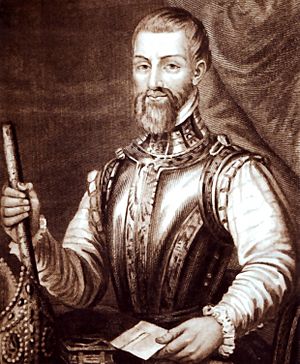Pedro de la Gasca facts for kids
Quick facts for kids
Pedro de la Gasca
|
|
|---|---|
 |
|
| Interim Viceroy of Peru | |
| In office 23 September 1551 – 21 July 1552 |
|
| Monarch | Charles V |
| Preceded by | Blasco Núñez Vela |
| Succeeded by | Antonio de Mendoza |
| Personal details | |
| Born | June 1485 Navarregadilla, Ávila Province, Spain |
| Died | 13 November 1567 (aged 82) Sigüenza, Spain |
| Occupation | Diplomat, bishop |
Pedro de la Gasca (born June 1485 – died 13 November 1567) was an important Spanish bishop and diplomat. He served as the second (acting) Viceroy of Peru from 1547 to 1550. His main job was to bring peace and order back to Peru after a big rebellion.
Contents
Early Life and Career
Pedro de la Gasca was a very smart person. He studied at two famous universities in Spain: the University of Salamanca and the University of Alcalá. He became a priest and also a lawyer.
In 1542, he showed his great skills as a diplomat. He worked for Emperor Charles V (the ruler of a large empire) in important talks with the Pope and King Henry VIII of England. This job needed a lot of skill in handling difficult situations.
Mission to Peru
At that time, Peru was part of the Spanish Empire. Gonzalo Pizarro, whose brother Francisco Pizarro had conquered Peru, started a rebellion. He even tried to become king himself. The previous viceroy, Blasco Núñez Vela, died in a battle against Pizarro in 1546.
Emperor Charles V had just finished a difficult war. He could not send a large army to Peru. Instead, he chose Pedro de la Gasca to fix the problem. La Gasca was given a lot of power to bring peace. He could forgive rebels or punish them.
La Gasca left Spain in May 1546. He traveled without soldiers or much money. Only two priests and a few servants went with him.
Arriving in Panama
When he reached Panama, La Gasca presented himself as a peacemaker. He said his goal was to bring back fairness and offer forgiveness to everyone. He also hinted that if he failed, a huge royal fleet with 15,000 soldiers was ready to sail from Spain. This fleet would use force to restore order.
Pizarro's ships were in Panama. La Gasca used his excellent diplomatic skills to convince Pizarro's officers to join his side.
Dealing with Gonzalo Pizarro
Gonzalo Pizarro, however, refused to give up. He secretly went to Cuzco, where he had loyal troops. La Gasca, now supported by most of Pizarro's fleet, landed in Tumbes in 1547.
He announced his mission to bring peace. He invited all good citizens to help him restore order. He also promised rewards to those who would fight for the King. Importantly, he canceled the "New Laws," which had caused the rebellion in the first place.
The Battle of Jaquijahuana
La Gasca quickly gathered a strong army. He led his troops towards Cuzco in December 1547. Pizarro met him on the plain of Jaquijahuana near Cuzco.
La Gasca preferred talking over fighting. He negotiated with Pizarro's officers, using promises and warnings. When the two armies met on 9 April 1548, most of Pizarro's men and officers switched sides to La Gasca. The King's forces won without a single fight.
La Gasca had Pizarro and some of his main supporters punished. He rewarded those who stayed loyal to the King and forgave most of the rebels. He also improved how justice was handled and how taxes were collected. He made rules to protect the native people from unfair treatment. La Gasca was known for being wise and fair, and he always did his duty.
Return to Spain
In 1549, La Gasca handed over his power. On 27 January 1550, he left Peru to go back to Spain. When he arrived, Emperor Charles V made him the bishop of Palencia. Later, in 1561, King Philip II promoted him to a higher position as bishop of Sigüenza.
Historian William H. Prescott wrote that La Gasca's success came from his honesty. He said that La Gasca didn't use force or tricks. Instead, he convinced people because they trusted him completely.
See also
 In Spanish: Pedro de la Gasca para niños
In Spanish: Pedro de la Gasca para niños
 | Kyle Baker |
 | Joseph Yoakum |
 | Laura Wheeler Waring |
 | Henry Ossawa Tanner |

